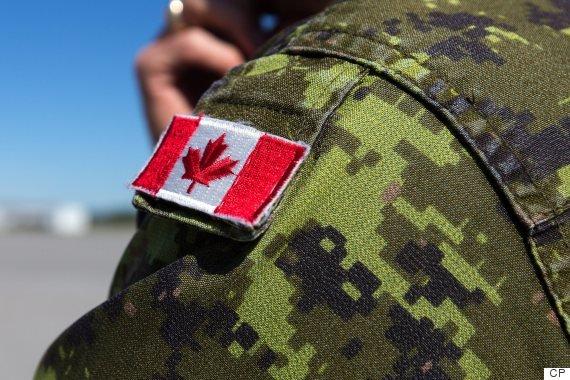Former Canadian military leaders say they failed sexual misconduct survivors and it’s time for civilian oversight
Advertisement
Read this article for free:
or
Already have an account? Log in here »
To continue reading, please subscribe:
Monthly Digital Subscription
$0 for the first 4 weeks*
- Enjoy unlimited reading on winnipegfreepress.com
- Read the E-Edition, our digital replica newspaper
- Access News Break, our award-winning app
- Play interactive puzzles
*No charge for 4 weeks then price increases to the regular rate of $19.00 plus GST every four weeks. Offer available to new and qualified returning subscribers only. Cancel any time.
Monthly Digital Subscription
$4.75/week*
- Enjoy unlimited reading on winnipegfreepress.com
- Read the E-Edition, our digital replica newspaper
- Access News Break, our award-winning app
- Play interactive puzzles
*Billed as $19 plus GST every four weeks. Cancel any time.
To continue reading, please subscribe:
Add Free Press access to your Brandon Sun subscription for only an additional
$1 for the first 4 weeks*
*Your next subscription payment will increase by $1.00 and you will be charged $16.99 plus GST for four weeks. After four weeks, your payment will increase to $23.99 plus GST every four weeks.
Read unlimited articles for free today:
or
Already have an account? Log in here »
Hey there, time traveller!
This article was published 10/05/2021 (1676 days ago), so information in it may no longer be current.
Former Canadian military leaders acknowledged Monday they failed to tackle sexual misconduct in the armed forces, and are now pushing for all sexual-related criminal allegations involving military members to be handled by civilian authorities.
Ex-senior members of the Canadian military and defence department serving with the Conference of Defence Associations and CDA Institute said in a statement Monday that “we did not do enough to address this scourge that is eating away at a storied and essential national institution.
“We also realize, as former senior leaders, that we collectively failed those that have been harmed during their military service. We missed opportunities to take sufficient action that may have prevented the current crisis facing the Defence Team.”

The Conference of Defence Associations is an umbrella organization comprised of 40 member associations representing more than 400,000 active and retired military members, while the CDA Institute conducts research on Canadian defence policy.
“Many former (Canadian armed forces) senior leaders believed for operational reasons that the investigation and prosecution of sexual misconduct cases should rest within the system of military justice,” the statement says.
“It is increasingly clear that the status quo is not acceptable and we believe that the only way forward is to ensure that all allegations of sexual crimes involving CAF members should be handled or have oversight by civilian authorities.”
The statement will be seen as a massive shift in mentality by members of an institution notorious for being wary of external oversight. The organizations that released the statement Monday include former vice chiefs of the defence staff, other senior commanders, and deputy ministers.
“I think the first instinct of course is to try to do things within the existing system, and if it’s not working properly, then trying to make it better…I think that’s the natural, initial kind of view for the senior leaders,” said retired Lt.-Gen. Guy Thibault, a former vice chief of the defence staff who serves as chair of the CDA Institute’s board and president of the Conference of Defence Associations, in an interview.
“When we look at the experience, however, of dealing with sexual misconduct, sexual assault, sexual crimes, clearly we’re in an area where the chain of command itself isn’t well positioned to deal with crimes of this nature.
“And victims themselves have been saying they want to have the option, the opportunity to go outside the chain of command, to feel protected, and I think we owe our members that.”
Sexual misconduct in the military has come under heightened scrutiny this year as two former chiefs of the defence staff are under military police investigation for alleged inappropriate behaviour, and the Liberal government is under fire over its handling of an allegation in 2018 against ex-top soldier Gen. Jonathan Vance.
The government announced last month yet another independent review of sexual misconduct in the military, to be led by retired Supreme Court Justice Louise Arbour.
The announcement was criticized by some as a deflection tactic by a government that has failed to even fully implement the recommendations from a previous, similar review completed in 2015.
The CDA said it welcomes the Arbour review, and also looks forward to recommendations from an ongoing review of the military justice system by retired Supreme Court Justice Morris Fish.
The Arbour review’s final report is not due for at least a year, and in the meantime, the CDA said the government should move to make the military’s civilian-run sexual misconduct response centre “fully independent.”
The centre, which provides supports to complainants and monitors the military’s progress on tackling sexual misconduct, does not fall within the military chain of command, but does currently report to the deputy defence minister.
Thibault served as vice chief from 2013 until his retirement in 2016, and his tenure included the launch by the military in 2015 of Operation Honour, an attempt to tackle sexual misconduct in the armed forces, as well as the creation of the sexual misconduct response centre.
“We were acting with our very best intentions to respond to these problems, but clearly those expectations have not been met,” he said.
“On a personal note, it just breaks my heart to see members of the Canadian forces who have been hurt, and from my perspective as a senior leader, I really regret the fact that I didn’t do more.”
Jacques Gallant is a Toronto-based reporter covering politics for the Star. Follow him on Twitter: @JacquesGallant

